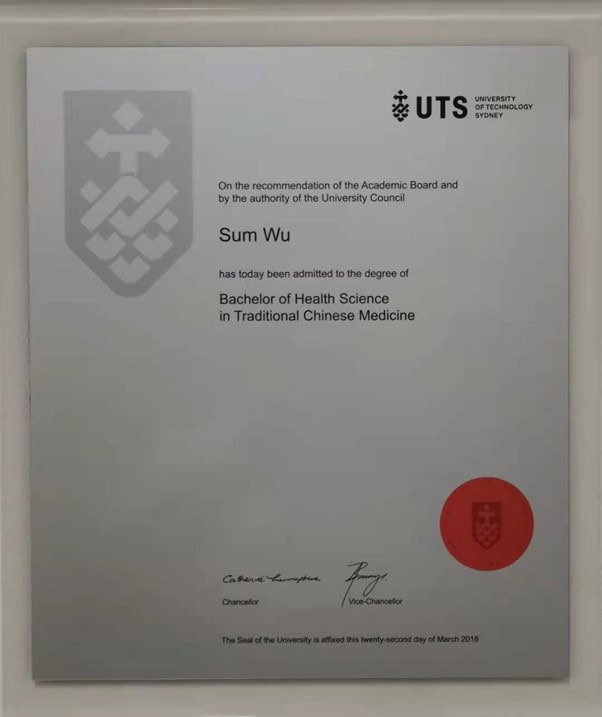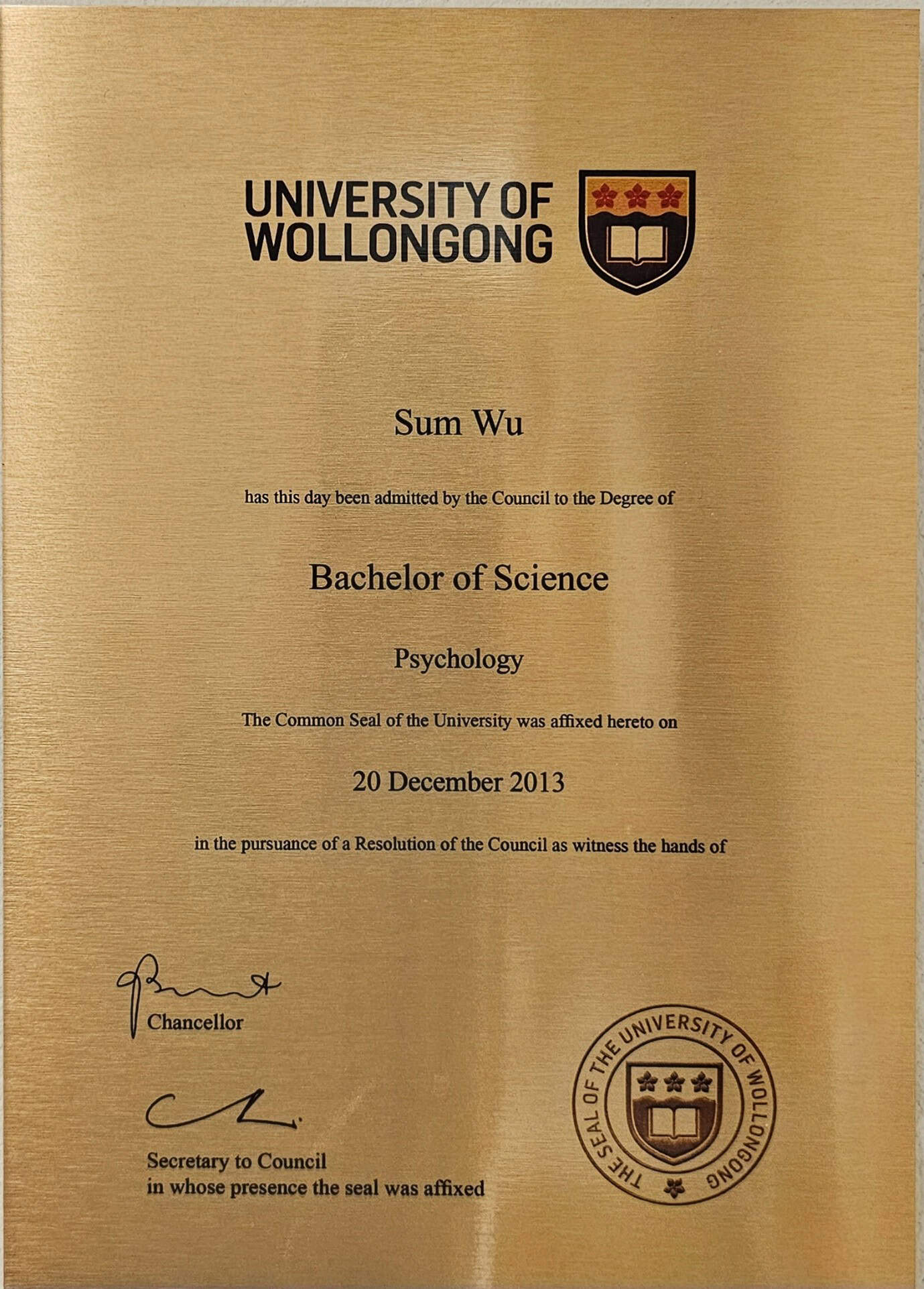 2025年08月12日 14:30 發布
編輯:Editor
2025年08月12日 14:30 發布
編輯:Editor
Sum Wu
Registered Chinese Medicine Practitioner
Bachelor of Health Science in Traditional Chinese Medicine (UTS)
Bachelor of Science Majoring in Psychology (UOW)
Director of Hurstville Chinese Herbs Centre
Vice Dean of College of Traditional Chinese Medicine Orthopedics Australia
Specialising in pain management and mental wellbeing through Tradition Chinese medicine in combination with modern science in mental health, dieting and nutrition.
吳宇琛,澳大利亞政府注冊中醫師、針灸師,五龍崗大學心理學學士、悉尼科技大學中醫系學士,澳大利亞松軒中醫藥中心主任醫師,澳大利亞中醫骨傷專科學院副院長。
擅長用傳統針灸理傷手法和中藥治療各種新舊損傷痛症,特別採用中醫中藥和現代心理學、營養學相結合調理治療各種慢性病和亞健康。


In Traditional Chinese Medicine (TCM), Shang Huo, often translated as “Heaty” or “excess internal heat,” is a common term used to describe a set of symptoms that signal an imbalance in the body’s Yin and Yang energies. While there is no exact equivalent in Western medicine, many of the manifestations of Shang Huo, such as sore throat, mouth ulcers, acne, and constipation, can be explained through modern biomedical concepts like inflammation, infection, and metabolic stress.
在傳統中醫(TCM)中,“上火”通常被翻譯為“內熱過盛”或“熱氣”,是一個常用來描述一系列症狀的術語,這些症狀反映了人體陰陽失衡的狀態。雖然西醫沒有完全對應的概念,但許多“上火”表現出的症狀,如喉嚨痛、口腔潰瘍、痤瘡和便秘等,可以通過現代生物醫學中的炎症、感染和代謝壓力等理論得到解釋。
The TCM Perspective中醫視角
TCM views health as a dynamic balance between Yin and Yang, maintained by the smooth flow of Qi and body fluids through the body’s meridians and organ systems. Heaty occurs when Yang energy becomes excessive, generating internal heat that disrupts this harmony. This imbalance often results from certain dietary habits, emotional stress, or environmental factors. Eating fried or spicy foods, drinking alcohol or caffeinated beverages, and consuming large amounts of sugar can all contribute to this state. Additionally, emotional strain, poor sleep, and living in hot, dry conditions may exacerbate the problem.
中醫認為健康是陰陽的動態平衡,這種平衡依賴於氣血和體液在經絡和臟腑中的順暢流動。“上火”則是指陽氣過盛,產生內熱,破壞了這種和諧狀態。這種失衡通常由某些飲食習慣、情緒壓力或環境因素引起。油炸或辛辣食物、酒精和含咖啡因飲料的大量攝入,以及高糖飲食,均可導致“上火”。此外,情緒緊張、睡眠不足和炎熱乾燥的環境也可能加劇這一狀況。
The symptoms of Heaty typically manifest as sore throat, swollen tonsils, painful or bleeding gums, mouth ulcers, or canker sores. It can also cause skin issues such as acne or rashes, digestive disturbances including constipation and dark urine, and systemic effects like irritability, insomnia, and a persistent sensation of heat within the body. TCM further classifies Heat into types based on the organs involved. For instance, Liver fire is associated with irritability and headaches, Stomach fire may present as bad breath and gum problems, and Lung heat often results in cough and throat pain.
“上火”症狀通常表現為咽喉痛、扁桃體腫脹、牙齦疼痛或出血、口腔潰瘍等,還可能引發痤瘡、皮疹、便秘、尿色深以及煩躁、失眠和持續的體內熱感等全身性表現。中醫進一步將“火”分為不同類型,根據受影響的臟腑而定。例如,肝火通常伴有煩躁和頭痛,胃火表現為口臭和牙齦問題,肺熱則常引起咳嗽和喉嚨痛。
Treatment in TCM focuses on clearing internal heat, draining fire, and restoring Yin-Yang balance. Practitioners commonly recommend herbal remedies, such as honeysuckle or chrysanthemum teas, and dietary adjustments that emphasize cooling foods like pears, watermelon, and mung beans. Acupuncture and lifestyle changes, including stress management and improved sleep, are also employed to help the body regain balance.
治療上,中醫側重於清熱瀉火,調和陰陽。常用的草藥有金銀花、菊花等清熱解毒的茶飲,飲食上強調梨、西瓜、綠豆等凉性食物。針灸和生活方式調整,如壓力管理和改善睡眠,也被廣泛採用,幫助身體恢復平衡。
The Western Medical Interpretation西醫視角
Although Western medicine does not recognize “Heaty” as a clinical diagnosis, many of the symptoms associated with Heaty are well understood. From a biomedical perspective, sore throats, swollen gums, and mouth ulcers often result from localized inflammation caused by infections or irritation from certain foods. Spicy or greasy meals can trigger acid reflux, leading to throat discomfort similar to TCM’s concept of rising internal heat. Constipation and dark urine are frequently linked to dehydration and low fibre intake, while acne and other skin flare-ups may be driven by hormonal changes, excess oil production, and systemic inflammation.
儘管西醫不承認“上火”作為臨床診斷,但與“上火”相關的許多症狀都能得到明確解釋。從生物醫學角度看,咽喉痛、牙齦腫痛及口腔潰瘍多由感染或某些食物刺激引起的局部炎症所致。辛辣或油膩食物可能誘發胃酸反流,造成類似於中醫所說“內熱上升”的喉嚨不適。便秘和尿色深多因脫水和纖維攝入不足所致,而痤瘡及其他皮膚炎症則可能與激素變化、油脂分泌過盛及系統性炎症有關。
Western medical treatment typically addresses these underlying causes directly. For example, bacterial throat infections may be treated with antibiotics, while anti-inflammatory medications, soothing mouth rinses, and dietary modifications can alleviate other symptoms. These approaches target the physical and biochemical processes causing discomfort.
西醫治療通常針對病因本身,例如細菌感染可能使用抗生素,抗炎藥物、口腔漱口劑和飲食調整等則用於緩解症狀,這些方法直接作用於引發不適的生理和生化過程。
Bridging the Two Perspectives兩者的融合
Despite the differences in theoretical frameworks, TCM and Western medicine share significant common ground. Both recognize that lifestyle and diet play critical roles in triggering symptoms commonly described as Heaty. Modern research has also begun to validate the anti-inflammatory and antioxidant properties of many herbs traditionally used to clear heat in TCM, suggesting that ancient practices may have tangible physiological effects. This growing body of evidence highlights the potential for an integrative approach that combines preventive strategies, dietary moderation, and complementary therapies from both traditions.
儘管理論體系不同,中醫和西醫在許多方面存在共通之處。兩者都認可生活方式和飲食對誘發“上火”相關症狀的重要影響。現代研究亦開始驗證許多傳統清熱草藥的抗炎和抗氧化作用,表明古老療法可能具有實際的生理效益。這些證據支持一種結合預防策略、飲食調節和兩種醫學傳統互補療法的綜合治療方法。
Heaty remains a central concept in Chinese health philosophy, reflecting the body’s internal balance and its responses to environmental and dietary influences. While Western medicine interprets these symptoms through the lens of inflammation, infection, and metabolic activity, TCM provides a holistic model focused on maintaining harmony and preventing illness. Understanding both perspectives allows individuals to make more informed health choices and to benefit from treatments that combine the strengths of both traditional and modern medical approaches.
“上火”作為中國健康哲學的核心概念,反映了人體內部平衡及其對環境和飲食影響的反應。西醫通過炎症、感染和代謝活動的視角解讀這些症狀,而中醫則提供了一個以維護和諧與預防疾病為中心的整體模型。理解這兩種觀點,有助於個人做出更明智的健康選擇,並從傳統與現代醫學優勢相結合的治療中獲益。
如有疑問想咨詢吳宇琛中醫師,可以在微信或whatsapp搜索61 404836368,加吳宇琛中醫師微信或whatsapp,也可以發短信或致電0404836368作語音留言,吳宇琛中醫師有空就會回復。
(吳宇琛中醫師,澳大利亞政府注册中醫師、針灸師,五龍崗大學心理學學士、悉尼科技大學中醫系學士,悉尼好思維松軒藥行主任中醫師,澳大利亞中醫骨傷專科學院副院長,本文僅供參考,具體診療應諮詢專業人士。)
